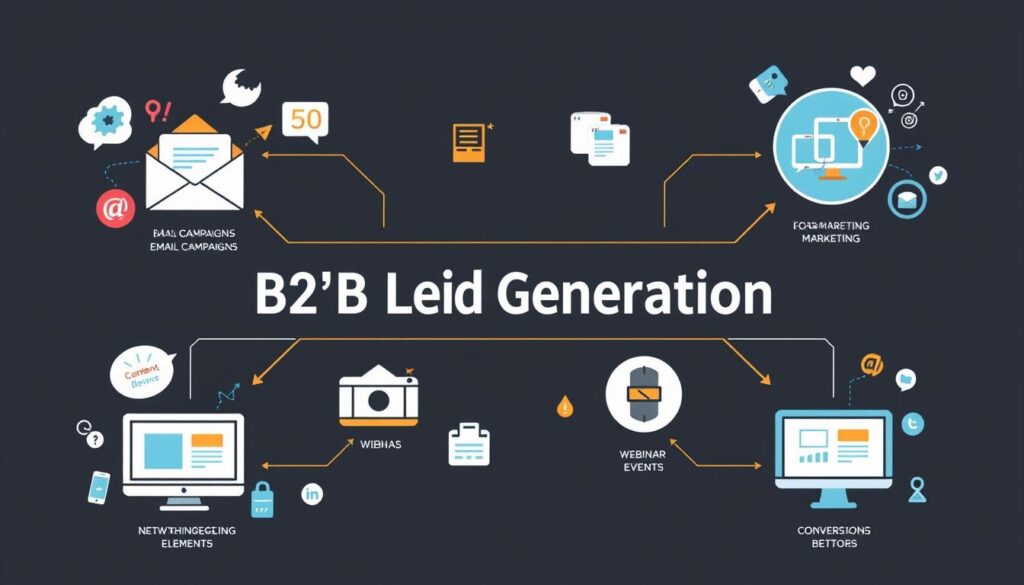B2B Marketing Lead Generation Strategies Unveiled
In the fast-paced world of B2B marketing, lead generation is key. It connects businesses to potential clients. It’s about building meaningful partnerships that share values and goals. Now, over 50% of B2B organizations have cut their budgets due to unexpected challenges. This calls for creative B2B lead generation strategies to adapt1.
Effective B2B marketing leads are more than just numbers. They are chances to grow through tailored efforts. Companies that succeed focus on strategic online outreach and personalized engagement. This attracts the right clients2. It’s important to focus on nurturing leads through the sales funnel.

Key Takeaways
- Lead generation forms the foundation of fruitful B2B relationships.
- Creativity and personalization are increasingly vital due to budget constraints.
- High-quality leads should be carefully nurtured to drive successful sales.
- Engagement strategies such as webinars and social media are crucial for lead generation.
- Understanding the nuances of your target audience can significantly enhance lead conversion rates.
Understanding B2B Marketing Lead Generation
B2B lead generation is key to finding companies that might need your products or services. It starts with collecting basic info like names and emails. This lets businesses reach out to promising leads. B2B marketing is different because it has longer sales cycles and more complex decisions.
Interestingly, 80% of B2B marketers use content marketing to find leads. This method is not only effective but also cheaper than traditional marketing, saving 62%3. Knowing the difference between Marketing Qualified Leads (MQLs) and Sales Qualified Leads (SQLs) helps target better. MQLs are not yet ready to buy, while SQLs are ready to talk to sales4.
As tech gets better, 80% of marketers think marketing automation gives them better leads. This tech helps companies connect with potential customers better, guiding them through their buying journey4. Also, 77% of businesses see more conversions with marketing automation in their lead strategies3.
Importance of Effective Lead Generation in B2B
Effective lead generation is key for B2B businesses to grow. Companies that use the best tactics can boost their brand and build strong relationships. For example, 67% of companies see lead generation as a key to content success5.
This shows how important lead generation is. When done right, it helps fill the sales pipeline and builds lasting client relationships.
Good B2B marketing leads are linked to more revenue. Lead generation helps brands reach the right people, which can increase revenue a lot5. Also, 75% of companies aim to grow fast by nurturing leads and making content personal6.
This trend shows a shift towards focusing on quality over quantity in lead generation. It’s about targeting fewer but better leads that are more likely to convert.
Trying out different lead generation methods can be very helpful. Using automation tools makes the process faster and easier5. Interactive content on websites grabs business leads’ attention. Videos, like webinars and demos, are also popular for generating leads5.
Core Strategies for B2B Lead Generation Success
To succeed in B2B lead generation, a mix of key strategies is needed. Focusing on buyer reviews is crucial, as 87% of B2B decision-makers check online reviews before buying7. Using top B2B lead generation methods like webinars is also effective. They help show off your expertise, and tools like Cisco WebEx and GoToWebinar are popular choices7.
Interactive marketing strategies, like content syndication and attending industry conferences, are also key. They help expand your reach and build your brand’s authority8. Live chat for support is gaining popularity, with 42% of customers preferring it for their queries. This shows the importance of quick, real-time interactions7. Creating a full LinkedIn profile can also boost your success when reaching out to leads8.
Creating high-quality content that boosts search engine visibility is a top priority. By using relevant keywords, we can attract business decision-makers and potential customers8. Short videos are great for quickly explaining product benefits and sparking interest8. Referral programs are also valuable, especially when it’s clear which leads qualify8.
Finally, using SEO tools like Ahrefs and Moz is essential for standing out in the digital market7. Engaging with decision-makers through interviews or guest posts can also expand your network7. By using these B2B lead generation services, we can lay a solid foundation for ongoing sales success.

| Strategy | Description |
|---|---|
| Buyer Reviews | 87% of B2B decision-makers seek online reviews, highlighting their impact on purchase decisions. |
| Webinars | Utilizing tools like Cisco WebEx to engage audiences and demonstrate expertise effectively. |
| Interactive Marketing | Strategies like content syndication and industry conferences to expand reach. |
| SEO Tools | Using platforms like Ahrefs and Moz to enhance website visibility and lead generation. |
Targeted Content Marketing for B2B
In my experience, content marketing is key for B2B lead generation. Creating content for a specific audience boosts marketing efforts. It helps connect with decision-makers. I focus on making eBooks, whitepapers, and case studies that meet potential clients’ needs9.
Working with a B2B lead generation agency is very helpful. Creating buyer personas is crucial. It makes sure content reaches the right audience9. Using internal experts also improves content quality, making campaigns more effective10.
Content must match the buyer’s journey for a good experience. Landing pages need clear calls to action. A mix of content types helps guide prospects911.

I explore different channels for B2B content marketing. Websites, social media, email lists, and industry sites are effective. Blogging B2B companies get 67% more leads than non-blogging ones, showing content’s power11.
To wrap up, B2B content marketing is vital for quality leads. A strategic approach and tracking engagement can boost lead generation. This drives business growth10.
Harnessing the Power of SEO in Lead Generation
In B2B marketing, using effective lead generation techniques is key to success. Search Engine Optimization (SEO) is a top digital marketing strategy. It boosts website visibility and attracts qualified traffic, opening up more lead generation opportunities12.
SEO lead generation means creating content that meets search engine needs and improves user experience12. By optimizing web content and improving site performance, I can grab the attention of potential clients. Having a mobile-friendly website is crucial since most traffic comes from mobile devices. A responsive design ensures a smooth user experience, boosting lead generation chances12.
Targeting long-tail keywords can lead to better lead generation results. Focusing on specific queries attracts visitors interested in niche topics. Understanding search intent is also key to creating content that resonates with users, improving search rankings and lead generation12.

Regularly updating blog posts keeps me visible in search results, adapting to changing trends. By defining target personas and using relevant keywords, I build a strong SEO strategy for effective B2B marketing leads13. SEO is not just about traffic; it’s about building valuable relationships and collecting contact information for ongoing engagement12.
Successful lead generation relies on data-driven decisions, allowing me to refine my approach. SEO can significantly increase conversion rates, with potential boosts of over 23% through effective strategies and updates14. Investing in ongoing SEO services keeps my website competitive, with monthly costs ranging from $3K to $10K, depending on the services needed14.
Utilizing Social Media for Lead Generation
Social media is key in today’s fast world for B2B lead generation. With 4.89 billion users worldwide in 2023, it’s vital to use platforms like LinkedIn and Facebook to connect with potential clients15. I focus on creating content that speaks to my audience. This approach helps me show my expertise, increase engagement, and boost lead generation.
When using social media for lead generation, I look at different tactics’ impact and cost. Marketers need to consider time and budget for each tactic to meet lead generation goals16. LinkedIn Lead Generation Forms stand out, with a 13% conversion rate, much higher than the usual 2.35% from landing pages15.
Retargeting on social media boosts my lead generation efforts. I use Facebook and Instagram ads, knowing 77% of marketers find retargeting effective15. I also use offers like webinars and free trials to turn leads into sales. With 9 out of 10 consumers likely to buy from brands they follow, building a strong social media presence is crucial15.

| Social Media Tactic | Potential Impact | Average Conversion Rate |
|---|---|---|
| LinkedIn Lead Generation Forms | High | 13% |
| Landing Pages | Moderate | 2.35% |
| Retargeting Ads | High | Varies |
| Webinars | High | Varies |
| Chatbots | Moderate | Varies |
Gated content like e-books and case studies help me get email leads by offering valuable info for contact permission16.I use these insights to improve my social media strategy for lead generation.
B2B Marketing Lead Generation Techniques
Effective B2B lead generation strategies use proven methods to boost sales. One key technique is using optimized forms that ask for minimal information from potential clients. This approach helps increase conversion rates. In fact, forms that ask for less info tend to work better, making them a crucial tool for me17.
It’s also important to nurture qualified leads. Targeted communication helps keep prospects engaged. Content marketing is a powerful way to generate B2B leads. Formats like webinars, case studies, and whitepapers engage and convert leads well17.This insight drives my approach to creating compelling content that resonates with my audience.
Aligning marketing and sales processes is another key aspect. This alignment leads to higher quality leads and better sales productivity18. Referrals from happy customers are the best way to attract new leads. Using platforms like LinkedIn Sales Navigator also boosts my lead sourcing efforts and streamlines my work.
Finally, using analytics to track performance is crucial. Monitoring conversion rates and marketing channel effectiveness helps me improve my strategies. Adding timely feedback to my processes ensures I attract and convert quality leads well19.

Implementing Marketing Automation in B2B
In today’s fast-paced business world, marketing automation for B2B is key for better lead generation. Tools like HubSpot and Marketo make it easier to connect with potential clients. They help streamline workflows.
Did you know 72% of marketers think AI and automation improve customer experiences? This is crucial for B2B relationships20. It lets businesses focus on quality leads, not manual tasks. Personalizing campaigns for different audiences boosts engagement.
FullStory saw a big jump in webinar registrations, from 75 to 360, with automation20. This shows how automation can change marketing. It cuts down event setup time and boosts attendance rates.
Also, 49% of companies use marketing automation, showing it’s a growing trend21. This tech brings in better leads and saves time. Businesses see a 10% increase in revenue and sales pipeline contributions21.
Automation helps me nurture leads with systematic emails. Katie Dunn from ThoughtSpot got over 1,000 leads from one virtual event20. This keeps engagement going and reduces lost opportunities.
Exploring automation tools helps align marketing with sales teams. It improves lead scoring and follow-ups. Marketing automation also helps measure campaign responses, ensuring a good return on investment21.

Leveraging Big Data for Scalable Lead Generation
In the competitive world of B2B marketing, leveraging big data is key for growing leads. Plans that use big data can see a 133% boost in leads and sales compared to those without22. Data helps businesses understand their audience better, making marketing more personal and effective23.
Using data analytics helps segment audiences for targeted marketing. This method improves lead generation by focusing on the right channels, like email23. Predictive analytics also helps predict customer actions, making marketing more precise22.
To really grow leads, following four key steps is essential: capturing, qualifying, nurturing, and converting leads22. Personalized marketing, driven by big data, boosts sales efficiency and conversion rates23.
Tracking KPIs like conversion rates and ROI helps see how well marketing works23. With smart data strategies, businesses can spot new chances and grow. This approach not only gets more leads but also keeps customers coming back.

| Strategy | Description | Benefits |
|---|---|---|
| Data Analytics | Utilizes insights to personalize communication and segment audiences. | Improved conversion rates and targeted campaigns. |
| Predictive Analytics | Forecasts customer behavior based on historical data. | Enhanced resource allocation and increased conversion rates. |
| Personalization | Customizes marketing efforts based on data insights. | Higher efficiency in sales processes and conversion rates. |
| KPI Monitoring | Tracks the effectiveness of lead generation strategies. | Identifies areas for improvement and validates success. |
Nurturing Leads through Email Marketing
Email marketing is key for nurturing leads in B2B. Almost 66% of marketers say it’s effective in engaging leads24. Sending personalized messages keeps prospects interested and informed as they buy.
Most website visitors aren’t ready to buy right away. This shows the need for nurturing strategies that meet their needs25. Companies are spending more on lead generation, with 70% seeing their budgets grow25.
Segmented email campaigns can boost revenue by 760%25. Targeting specific traits like job title and location makes emails more personal. For example, Ubisoft’s emails get a 17% click rate, much higher than usual26.
Knowing the right email length is crucial. Emails should be 50-125 words for better engagement. The first follow-up can get a 40% higher reply rate24.
Companies that nurture leads well get 50% more sales-ready leads at 33% lower costs25. This shows nurturing efforts pay off. Marketers should focus on testing and improving their campaigns. Sharing relevant materials can increase conversions by 72%25.
Building Trust with Customer Testimonials
Customer testimonials are key in building credibility through testimonials. They greatly impact B2B lead generation services. Studies show that user-generated content is the most trusted by B2B buyers. This highlights the value of real customer feedback over marketing claims27.
This trend shows the need for genuine customer feedback. It shows real satisfaction and is a strong marketing tool28.
Businesses can use different formats like case studies and video testimonials to connect with their audience. Videos are powerful but can be pricey, especially for small businesses28. Still, companies that use testimonials well see big improvements in getting leads.
For example, those with well-developed B2B lead generation see a 133% increase in revenue. This shows the financial gain of building trust through testimonials29.
Using personalized marketing with testimonial insights is a top strategy for B2B marketing. An amazing 89% of B2B buyers say thought leadership content improves their view of a company27. This helps prospects connect with testimonials, leading to better engagement and sales.
Creative use of social proof, like displayed testimonials, builds confidence in potential clients. It makes them more likely to choose one business over another28.
Conclusion
In the world of B2B marketing lead generation, using effective strategies is key for growth. We’ve looked at many tactics, like knowing the difference between Marketing Qualified Leads (MQLs) and Sales Qualified Leads (SQLs)30. This is important because each stage of the sales funnel has its own needs.
The shift to digital has made content more important for B2B lead generation31. Companies that focus on relevant content see a 12% higher sales acceptance rate. This shows how crucial it is to have the right content.
Using a wide range of lead generation strategies helps businesses stay ahead31. This summary of strategies highlights the importance of knowing your audience. It also shows the value of building relationships through regular contact.
In the end, keeping up with new ideas in B2B marketing lead generation is crucial. It helps create strong connections with clients and leads to lasting success.
FAQ
What is B2B marketing lead generation?
B2B marketing lead generation is about finding potential business clients. It’s about gathering information and building relationships with them. The goal is to turn them into loyal customers.
Why is effective lead generation important for B2B businesses?
It’s key for B2B growth. It boosts brand visibility and builds important relationships. It also drives sales. By using the right strategies, companies can grow their sales pipeline and keep clients for the long term.
What are some of the best B2B lead generation tactics?
Top tactics include content marketing, SEO, email marketing, and social media. Webinars and customer testimonials also work well. These methods help attract and nurture leads, leading to better sales.
How does content marketing contribute to B2B lead generation?
Content marketing offers valuable insights to the right audience. Formats like eBooks and whitepapers engage decision-makers. This boosts engagement and conversion rates.
What role does SEO play in B2B lead generation?
SEO drives quality traffic to B2B sites. Optimizing content with keywords improves visibility. This attracts prospects looking for solutions, increasing inbound leads.
How can social media be effectively utilized for lead generation in B2B?
LinkedIn and Twitter are great for targeted outreach. Advertising and organic engagement build meaningful relationships. This showcases thought leadership and drives lead generation.
What is the significance of marketing automation in B2B lead generation?
Marketing automation streamlines workflows. It enables personalized emails and audience segmentation. This boosts lead nurturing and conversion, improving efficiency and revenue.
How can big data enhance B2B lead generation efforts?
Big data helps identify trends and improve processes. Data analytics and predictive analytics tailor marketing strategies. This aligns with customer behavior, boosting lead generation success.
What role does email marketing play in nurturing B2B leads?
Email marketing is a key tool for nurturing leads. Personalized messages with valuable content engage prospects. This fosters lasting relationships and drives conversions.
How can customer testimonials aid in B2B lead generation?
Testimonials and case studies build credibility. They show positive experiences, which potential clients trust more than marketing claims. This boosts reputation and confidence, aiding in lead acquisition.